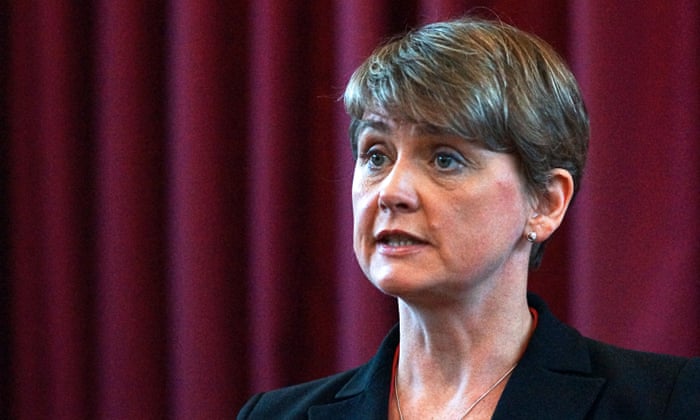Labour leadership candidate will say it is unprecedented for a government to abuse its small Commons majority to try to cripple an opposition party

Yvette Cooper will raise the prospect this week of a legal challenge to the trade union bill, which threatens Labour’s funding and limits the right to strike.
The Labour leadership candidate will say she has received legal advice suggesting the legislation would undermine freedom of association as set out in article 11 of the European convention on human rights.
That should prevent the business secretary from certifying the bill and lays the foundation for a legal challenge if it passes in to law, she will say.
The legislation will require all 4.5 million union members to sign a form at least every five years opting into paying the political levy to Labour.
Unions funds are Labour’s chief source of donations, and some union leaders have warned the planned reform will bankrupt the party.
Cooper will argue that it is unprecedented for a government to abuse its small majority in the Commons to try to cripple an opposition party through partisan measures to cut its funding, while doing nothing to provide transparency over corporate donations to the Tories.
She will say: “I am not going to stand back whilst this government takes aim at hard-fought workers’ rights, abuses their small majority to try to destroy the Labour party while it is in opposition. This bill is an ideological attempt to restrict the trade union and Labour movement’s ability to advance or defend the interests of ordinary people and their families.
“I will do everything I can to oppose this anti-democratic bill in parliament, but if the Tories force it through we need to be ready to take the unusual move of challenging them in the courts too. We cannot let the Tories get away with this malicious political attack on democracy, the Labour party and people’s right to associate and organise through trades unions.”
In July, David Cameron defended the trade union bill from criticism from Labour’s interim leader, Harriet Harman, claiming the party was “in hock” to the unions.
He told the Commons at prime minister’s questions: “The fact is people affected by these strikes don’t get to vote. That is why it’s right to have these thresholds and I think the whole country will see a Labour party utterly in hock to the trade unions and they’ll see a Conservative party wanting to sort this out for hard-working families.”
The Labour leadership candidate will say she has received legal advice suggesting the legislation would undermine freedom of association as set out in article 11 of the European convention on human rights.
That should prevent the business secretary from certifying the bill and lays the foundation for a legal challenge if it passes in to law, she will say.
The legislation will require all 4.5 million union members to sign a form at least every five years opting into paying the political levy to Labour.
Unions funds are Labour’s chief source of donations, and some union leaders have warned the planned reform will bankrupt the party.
Cooper will argue that it is unprecedented for a government to abuse its small majority in the Commons to try to cripple an opposition party through partisan measures to cut its funding, while doing nothing to provide transparency over corporate donations to the Tories.
She will say: “I am not going to stand back whilst this government takes aim at hard-fought workers’ rights, abuses their small majority to try to destroy the Labour party while it is in opposition. This bill is an ideological attempt to restrict the trade union and Labour movement’s ability to advance or defend the interests of ordinary people and their families.
“I will do everything I can to oppose this anti-democratic bill in parliament, but if the Tories force it through we need to be ready to take the unusual move of challenging them in the courts too. We cannot let the Tories get away with this malicious political attack on democracy, the Labour party and people’s right to associate and organise through trades unions.”
In July, David Cameron defended the trade union bill from criticism from Labour’s interim leader, Harriet Harman, claiming the party was “in hock” to the unions.
He told the Commons at prime minister’s questions: “The fact is people affected by these strikes don’t get to vote. That is why it’s right to have these thresholds and I think the whole country will see a Labour party utterly in hock to the trade unions and they’ll see a Conservative party wanting to sort this out for hard-working families.”




No comments:
Post a Comment